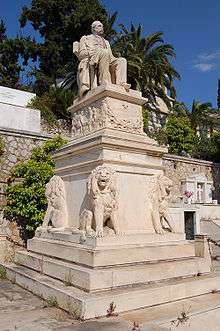George Averoff


George M. Averoff (15 August 1815, Metsovo – 15 July 1899, al-Raml/Ramleh, Alexandria), alternately Georgios Averof (in Greek: Γεώργιος Αβέρωφ), was a Greek businessman and philanthropist. He is one of the great national benefactors of Greece. Born in the town of Metsovo (Epirus, Greece, then Ottoman Empire) Averoff moved to Alexandria while still young. He was known through most of his life for founding numerous schools in both Egypt and Greece.
Biography
George Averoff was of Aromanian origin.[1] He moved to Cairo, Egypt, in 1837 to work in his brother, Anastasios’s, shop. Thanks to his bold tactics and business activities he became the biggest merchant in Egypt. At the same time he got involved in the banking business, the real estate business (buying and leasing land) while with his many riverboats traveling up and down the Nile he managed to dominate Egypt’s domestic and foreign trade. His business activities resulted in the accumulation of vast wealth which he used to donate to charity and common good purposes. His multilevel charity work includes significant donations for the development of educational and other infrastructure projects to the Greek community of Alexandria, Metsovo, Athens and the Greek state in general. Among them, the most notable ones are the founding of the School of Agriculture in Larisa, the construction of the Evelpidon Military Academy, the donation to the Athens Conservatory, the donation for the refurbishment of the Panathenian Stadium, where the first modern Olympic Games were held, the completion of the National Technical University of Athens and the donation for building the namesake flaghip of the Greek Navy.
The restoration of the Panathenian Stadium for the 1896 Summer Olympics was done at the request of Crown Prince Constantine. The stadium was refurbished in 1895, its second refurbishment in the 19th century, using white marble from Mount Penteli pursuant to Averoff's request. The cost was initially estimated at 585,000 drachmas but eventually reached 920,000.[2]
He also served as a member of the reception committee for the foreign competitors at the Games.
Georgios Averof died in Alexandria in 1899. In gratitude for his generous donations and services, the Greek state declared him a Major National Benefactor and commissioned a marble statue of him which was placed in front of the Panathenian Stadium. It remains there today.
In addition, a Greek cruiser, the flagship of the Hellenic Navy, which was constructed largely with funds (2,500,000 Gold francs) provided for under his will, was named after him.
See also
References
- ↑ Richard Clogg. A Short History of Modern Greece. p. 96.
- ↑ The Modern Olympics: A Struggle for Revival, by David C. Young, p. 128. The Johns Hopkins University Press. 1996. ISBN 0-8018-5374-5
Sources
- I. Chatzifotis, “Oi Metsovites stin Aleksandreia” [The Metsovites in Alexandria], Minutes of the 1st conference of Metsovite Studies, Athens 1993, pp. 87–96.
- V. Skafidas, “Istoria tou Metsovou” [History of Metsovo], Epirotiki Estia 12/131, 133 (1963), pp. 294–299, 392-396.
- G. Plataris-Tzimas, Kodikas Diathikon, Meizones kai elassones euergetes tou Metsovou [Log of Wills, Major and Minor Benefactors of Metsovo], Vol. A’, publ. of the Prefecture of Ioannina and the City of Metsovo, Metsovo/Athens 2004, pp. 288–333.
- A. Politou, O Ellinismos kai I Neotera Aigyptos, Vol. A’, I istoria tou aigyptiotou ellinismou 1798-1927 [Greeks and modern Egypt, vol A, the history of Greeks of Egypt, 1798-1927], publ. Grammata, Aleksandreia-Athens 1928-1930, 256, 258-263.
External links
- His life in short
- About the ship
- About the statue
- George Averoff at Find-A-Grave
|